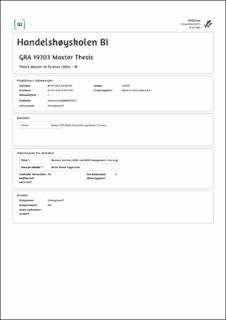| dc.description.abstract | The importance of waste management has increased in the last decade. Resources are becoming scarcer and the need for a circular mindset has become prominent. We need to reduce the amount of waste, and reuse and recycle as much as possible. Plastic packaging waste is a substantial problem when it comes to waste management. It is often contaminated with food waste, and it is hard to sort and recycle due to mixed polymers.
Producer responsibility organisations (PRO) are important actors on the Norwegian waste market. They are financed by the producers and arrange for different waste fractions to be recycled. Municipalities are responsible that waste is collected, and they have coinciding interests with PROs as they reimburse them for the amount of packaging waste that is collected. There has been little to none research regarding how this relationship works and how they try to help each other improve. Therefore, we set out to explore and understand this relationship as well as the municipalities role as a supplier, to better understand how we can increase recycling and reach current targets.
We conducted a multiple case study where we interviewed the two operating PROs, as well as four municipalities or inter-municipal companies in eastern Norway. One important factor for choosing interview objects was their choice of collection system. The collection system is an important factor when it comes to the amount that is collected and sorted, so we wanted to see whether there were any relational differences between the systems.
The results were not too surprising, as we did not expect the relationship to be very important, however we were able to apply exiting B2B literature in this unique setting. There is no evidence to support that the relationships and roles significantly impact recycling or choice of system, but there is potential for closer relationships. Other than this, it was emergent that rules and regulations need to be improved and that sorting of food waste is of bigger importance than we first anticipated. | en_US |
